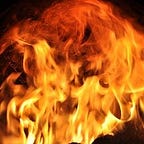The Aroma of Al Andalus: A Recipe Written by Christians, Jews, and Muslims
The Wood-Oven Cook in the Mediterranean Garden
Spain’s location in the historical geography of food is at the heart of the chronotopics of culinary discovery: chilies, potatoes, and tomatoes arriving from the west; black pepper and yellow saffron from the east; but what became of the cooks of Al Andalus — the Muslims and Jews exiled onto the trading ships of the Mediterranean and the silk road when Columbus set sail for the Americas. How was this mythic culture affected by, and how did it affect, the culinary traditions of the levant.
He put his pencil down and walked over to the window and looked at the cloud beginning to dissolve down the mountain across the reservoir. The cookbook writing was producing more questions than answers. The photographs Susanne had taken were all there for 50 recipes. This story is about wood and ovens and good slow food, he thought, not ancient cooks adrift on the Mediterranean. Yet he looked out and wondered what had happened to the Sephardim because of this exodus: What did they cook when they were cohabiting in Spain with the Catholic and the Muslim; How did they adapt in Morocco, Libya, Tunisia, and Palestine; What happened when they encountered other cultures, foods, and spices. Was adsorption the cultural process at work; how did this adsorption function, or was there adsorption at the edges where these cultures met?
Summer on the mountain, where the Manzanares river begins its journey down to Madrid, Spain, often brings a traveler or two to the gate. Varda had announced her visit from the Holy Land with her husband Bentsi and their teen-age son, Eden. She had asked what she could bring as a gift. I’d been reading and hearing intriguing bits and starts about Israeli cuisine for several decades, but I wanted a taste; “bring spices”, I responded, “unusual spices”.
If asked, I’d always request spices. Janet asked and had brought chili powder from North Carolina; a Mexican tortilla press; and the photographer from Woodstock. Larbi asked, and brought dried Moroccan spices, Somontano wines, and pastries from the Pyrenees. Khalil, from the Rif mountains, brought along bags and jars of colorful spices and a Tagine.
Varda’s spice filled bags, stuffed into a rectangular Tupperware box that had made it through Israeli airport security and Spanish customs in her suitcase, were unpacked and spread out on the kitchen table. Some had labels in Hebrew and some had no label at all. I got the empty spice jars out of the dishwasher and looked around for some order. Varda and Susanne came into the kitchen and soon took over: writing a description of the use of the contents: chicken, meat, vegetables.
Madrazo y Kuntz, Federico de (1815–1894)
Real Establecimiento Litográfico de Madrid-
1831?
Ver en la Biblioteca Digital Hispánica http://bdh.bne.es/bnesearch/detalle/bdh0000151060
Some of these colorful bags required a story. For instance, Za’atar. On the roads by her village, the Arabs, Varda explained, sold a flat bread topped with Za’atar and olive oil. A fresh sourdough rye I had baked the day before formed a sorption edge on the counter as I measured the thickness and density of a za’atar olive oil layer. The bread disappeared. “It’s also good on salad and vegetables,” she explained, “I make pizza with that flat bread.”
Yet other spice mixtures are not found on the road, but must be awakened from the silence of ancestral memory.
Yet other spice mixtures are not found on the road, but must be awakened from the silence of ancestral memory. When smaller the sign, greater is the significance: fewer ingredients, greater affect. I call Eden to come with me into the kitchen and help me make a couscous. “But I've never made couscous”, he fires back. Yet with out protest he joins me in the kitchen.
We had been to the neighborhood arab fruit and vegetable market and the butcher just before they closed for lunch. I bought what I’d seen Khalil put into the pot: a kind of turnip, nabo in Spanish; carrot; cabbage; Italian green peppers; fresh coriander; zucchini; and squash. And over at the butcher’s, several thick meaty pieces from the back of the beef ribs.
Eden’s paternal grandmother was born in Libya and were likely Sephardi; those ladino speaking Jews from the Iberian peninsula expelled by Isabella and Ferdinand in 1492.
Although Eden was reluctant at first to offer any suggestions, he helped peel the vegetables, while I put a large sauce pan on high heat with a healthy pour of extra virgin olive oil from the 5 liter tin. Into the pot with the chopped onions, turnip, and peppers. “What spices did your Grandmother use, Eden.” I brought the spices over to the stove; he poured ground ginger and I added fresh ginger; he added cumin, cloves, muskat, a cinnamon stick and curcuma. I added fresh ground pepper, hot paprika, and a piece of smashed garlic. Then the meat, cut into big cubes. The pan was getting too hot so I splashed in white wine, turned down the heat, and poured a beer into a frozen glass.
By late afternoon, tummies became aroused by the savory aroma of the couscous sauce infusing the bedrooms hosting their siestas; onto the terraces; and out by the aljibe. The sauce quickly disappearing into bowls of steamed couscous. Eden’s mother said it was a better couscous than her mother’s.
